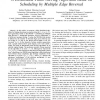Free Online Productivity Tools
i2Speak
i2Symbol
i2OCR
iTex2Img
iWeb2Print
iWeb2Shot
i2Type
iPdf2Split
iPdf2Merge
i2Bopomofo
i2Arabic
i2Style
i2Image
i2PDF
iLatex2Rtf
Sci2ools
ISPDC
2005
IEEE
2005
IEEE
A Distributed Prime Sieving Algorithm based on Scheduling by Multiple Edge Reversal
Abstract— In this article, we propose a fully distributed algorithm for finding all primes in an given interval [2..n] (or (L, R), more generally), based on the SMER — Scheduling by Multiple Edge Reversal — multigraph dynamics. Given a multigraph M of arbitrary topology, having N nodes, the SMER-driven system is defined by the number of directed edges (arcs) between any two nodes of M, and by the global period length of all “arc reversals” in M. In the domain of prime numbers generation, such a graph method shows quite elegant, and it also yields a totally new kind of distributed prime sieving algorithms of an entirely original design. The maximum number of steps required by the algorithm is at most n + √ n. Although far beyond the O(n/ log log n) steps required by the improved sequential “wheel sieve” algorithms, our SMER-based algorithm is fully distributed and of linear (step) complexity. The message complexity of the algorithm is at most n∆N + √ n∆N , where ...
| Added | 25 Jun 2010 |
| Updated | 25 Jun 2010 |
| Type | Conference |
| Year | 2005 |
| Where | ISPDC |
| Authors | Gabriel Paillard, Christian Antoine Louis Lavault, Felipe Maia Galvão França |
Comments (0)

